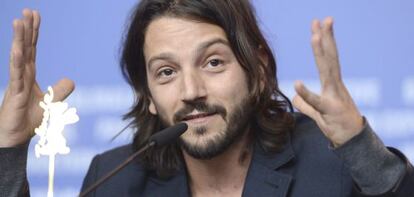Diego Luna: “A psychiatrist would get a lot out of me”
The Mexican actor-director’s latest charts the life of Latino labor leader Cesár Chávez


During the time Mexican actor and director Diego Luna lived in Los Angeles — his eldest son was born there — he came across quite a few streets, pieces of graffiti and murals dedicated to César Chávez. He started researching the Arizona-born union leader, who won rights for the migrant laborers who picked grapes in California in the early 1960s. It was a five-year struggle that included a boycott of the fruit and his own hunger strike. Chávez’s fight made him a Time magazine cover star, though few remember him today.
“The United States is a country that tells the stories of all its heroes and celebrates them,” Luna says. “In the rest of the world we are not like that; we also have them. There are even Hollywood films about normal events that, thanks to celluloid, become heroic. Despite all of this, there has never been a film about César Chávez, because he represents an uncomfortable truth, because he came from a community that had yet to be accepted by the rest.”
Which is why Luna decided to make him the subject of his second dramatic feature as director (he also directed the documentary J. C. Chávez), César Chávez, which premiered in the Berlin Film Festival’s Special program on Wednesday. More than one person, however, has questioned why it isn’t featuring in the official Competition. “I couldn’t imagine the pressure of the competition today. When I started shooting, I wasn’t personally prepared. But that feeling of the history, which I felt myself on set, of going against something that allowed me to move forward, helped the final outcome a lot.”
People think Chávez was Mexican, but he was born in Arizona”
Luna has found his creative spark as a filmmaker. So much so that he now feels a better director than he is an actor, or at least he has decided to take the acting more slowly. “It is my first time doing promotion and I don’t have anything else shot, on the verge of coming out. In reality, as actors we don’t tell our stories, and if we try, we annoy the person who has to be the real storyteller: the director. I felt that I was starting to be too annoying on set and now, after directing, I’m more relaxed — I go with the flow.”
César Chávez reopens old wounds relating to Latinos in the United States. “Look, people think he was Mexican, and he was born in Arizona. In fact, when he moved to California to support the migrant laborers, he had to improve his Spanish.”
The same thing happened to the actor who plays him on screen, Michael Peña: born in Chicago, the film forced him to rediscover his Hispanic roots. “It is not a coincidence that those of us who produced the film are a Mexican company, with offices in California. A sign of the times. And we shot almost all of it in Mexico because we had freedom there.”
Though Chávez triumphed, many witnesses to those events, Luna explains, “still don’t eat grapes.” The labor leader, who died in 1993, was concerned about his legacy. “It is a film about fathers and sons. César explains his steps and tries to repair his relationship with his eldest son; his adversary, the landowners’ spokesman [John Malkovich] also thinks about what his family will inherit. Yes, in the end I looked for connections between them and with the audience.”
Don’t all his films end up talking about father-son relationships? “A psychiatrist would certainly get out a lot out of me. I get on well with my dad, but it’s true that I became an actor drawing from his world.”
César Chávez leaves you with an honest portrait of its hero, with both his defects and his humanity. “He was a great man, but he also made mistakes. And behind him he had Dolores, his wife, who was ahead of her time, in relation to Latino chauvinism, and at many times was his driving force.”
Tu suscripción se está usando en otro dispositivo
¿Quieres añadir otro usuario a tu suscripción?
Si continúas leyendo en este dispositivo, no se podrá leer en el otro.
FlechaTu suscripción se está usando en otro dispositivo y solo puedes acceder a EL PAÍS desde un dispositivo a la vez.
Si quieres compartir tu cuenta, cambia tu suscripción a la modalidad Premium, así podrás añadir otro usuario. Cada uno accederá con su propia cuenta de email, lo que os permitirá personalizar vuestra experiencia en EL PAÍS.
¿Tienes una suscripción de empresa? Accede aquí para contratar más cuentas.
En el caso de no saber quién está usando tu cuenta, te recomendamos cambiar tu contraseña aquí.
Si decides continuar compartiendo tu cuenta, este mensaje se mostrará en tu dispositivo y en el de la otra persona que está usando tu cuenta de forma indefinida, afectando a tu experiencia de lectura. Puedes consultar aquí los términos y condiciones de la suscripción digital.








































